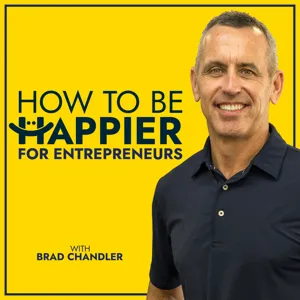Podcast Summary
Understanding anxiety as a catalyst for growth and resilience.: Anxiety is a common emotion that should not be stigmatized. Recognizing its universality can decrease self-judgment and empower individuals to seek help and thrive.
Anxiety is a common and normal emotion that everyone experiences at some point in their lives. Dr. David Rosmarin, an expert in mental health and anxiety, shares that even he has struggled with anxiety, which has helped him better understand and connect with his patients. He emphasizes that anxiety is not something to be ashamed of or judged for, but rather seen as a catalyst for growth and resilience. Many people mistakenly believe that they are the only ones experiencing anxiety, leading to feelings of isolation and distress. Recognizing that anxiety is a shared human experience can reduce self-judgment and help individuals seek appropriate tools and approaches to manage and thrive in the face of anxiety.
Understanding Anxiety: A Misfiring Fear Response: Anxiety is a misfire of the fear response, highlighting our body's ability to detect threats. It is important to recognize and understand different types of anxiety experiences.
Anxiety is a false alarm of the fear response. While fear is a healthy emotion that helps us survive by triggering the fight or flight response, anxiety is when the fear response goes off unnecessarily. It shares the same brain circuitry and neurobiology as fear, but it is a misfire. Just like a smoke alarm indicating that it's functioning properly, anxiety shows that our protective mechanism is in place. It highlights that our body is equipped to detect potential threats. However, anxiety can be uncomfortable and often misunderstood. It is important to understand the distinctions within the broader anxiety space, such as panic disorder, social anxiety, and generalized anxiety, as not everyone experiences anxiety in the same way.
Recognizing the Lesser-Known Responses to Anxiety: Understanding and acknowledging the freeze and fawn responses to anxiety is vital in effectively addressing and managing it, alongside the more commonly discussed fight and flight responses.
Anxiety can manifest in different ways, including the fight, flight, freeze, and fawn responses. While the fight and flight responses are often discussed, the freeze and fawn responses are less commonly known. The freeze response can occur in situations of social anxiety, where individuals feel a false alarm about potential rejection or harm. Instead of running away or fighting, they may freeze, making themselves subservient and overly complimenting others. This response may not be as natural or automatic as the fight or flight response, but it is still a part of the fear response. Recognizing and understanding the different manifestations of anxiety is crucial for addressing and managing it effectively. Increased awareness and acceptance of mental health have brought positive changes, but there may also be unintended consequences, such as lowering the threshold for diagnosing anxiety.
The Pressure to Always Feel and Look Good in a Social Media Era: Building resilience through face-to-face interactions and meaningful connections is crucial in handling the pressure to always feel good and look good in a society driven by social media.
Our generation is faced with the pressure to always feel good and look good, which is not realistic or healthy. This message has been perpetuated by social media and technology, making it easier for us to compare ourselves to others and see the negative aspects of the world. However, this pressure varies across cultures and countries. In countries where social media is used to replace in-person social engagement, anxiety levels tend to be higher. This suggests that face-to-face interactions and dealing with real-life situations are important for building resilience. In our society, we are lacking community and meaningful connections, which further exacerbates the anxiety epidemic. It is crucial to accept that distress is a normal part of life and focus on developing resilience to handle adversity.
Rethinking Anxiety Treatment: Moving Beyond Medication: Overcoming anxiety involves setting boundaries, facing it head-on, and cultivating emotional resilience, rather than relying solely on medication.
Our approach to treating anxiety has changed, particularly in terms of overmedicalization. Jemma Sbeg and David Rosmarin discuss how anxiety is often treated with medication, leading to the reliance on drugs and the potential for their misuse. They emphasize the importance of setting boundaries and facing anxiety head-on instead of avoiding conflicts or constantly seeking external solutions. They highlight the need for cultivating emotional resilience and practicing skills like enforcing boundaries, which are not always easy but are essential for personal growth. It is also acknowledged that our current generation tends to engage in people-pleasing behaviors and conflict aversion more than before. Ultimately, the key takeaway is that addressing anxiety requires a holistic approach rather than relying solely on medication.
Managing Anxiety: Understanding the Role of Medication: Medication can help reduce anxiety to a manageable level but won't eliminate it completely. It's important to approach medication with the understanding that its purpose is to assist in managing anxiety, not eradicate it.
There are different approaches to managing anxiety and medication should be taken with the right intent. Medications can be helpful in reducing anxiety to a manageable level, but they won't completely take it away. It's important to understand that anxiety is a natural response that serves a purpose in protecting us. If anxiety becomes too overwhelming, pharmacological intervention can help bring it back to a regular level. However, relying solely on fast-acting medications like benzodiazepines can reinforce the idea that anxiety should never be felt and lead to further sensitization. It's crucial to approach medication with the understanding that it won't completely eliminate anxiety, but rather assist in managing it.
Overcoming Anxiety and Panic: Embracing Discomfort and Confronting Fears: By leaning into discomfort and confronting our fears, we can diminish their hold on us and find relief from anxiety and panic attacks.
Leaning into discomfort and facing our fears can help us overcome anxiety and panic attacks. Jemma's experience with using Valium showed that while it temporarily relieved her fear response, it ultimately increased her avoidance behavior and irrational fears. David emphasizes the importance of getting comfortable with being uncomfortable and actively confronting our anxieties. By examining our fears and asking ourselves "so what?" we can challenge their power over us. David himself practices leaning into discomfort and talks about his stressors in detail, allowing the fear to wash over him. This approach activates the parasympathetic nervous system, leading to a calm state. It is important to remember that panic attacks rarely last more than 90 minutes and rarely lead to dangerous actions. Therefore, facing discomfort and embracing our fears can ultimately diminish their hold on us.
The Power of Anxiety: Enhancing Connections and Building Strong Relationships: Anxiety can be a personal comfort and a superpower, enabling individuals to understand and respond to the emotions of others, leading to deeper, more meaningful connections and stronger relationships.
Anxiety can be seen as a personal comfort and a superpower when it comes to understanding and responding to the emotions of others. People who experience anxiety, especially social anxiety, have the ability to pick up on nuanced cues in facial expressions, body language, and voice intonation. This can enhance their connection with others and make them better friends. While they may have a smaller group of friends and not be the life of the party, their intimate connections can be much deeper and more meaningful. By using anxiety to understand the emotional experiences of others, they can become closer and build strong relationships based on vulnerability and support.
The Power of Opening Up: How Sharing Anxiety Experiences Can Strengthen Family Bonds: By embracing and discussing our own anxiety, we can develop empathy and understanding for others, fostering strong relationships and breaking down barriers.
Embracing and opening up about our own experiences with anxiety can have a positive impact on our relationships, particularly with family members. Jemma's personal journey of recognizing her own anxiety allowed her to empathize with her father's struggles and foster a stronger bond with him. Despite cultural barriers and societal expectations, their shared experiences of anxiety brought them closer together. This highlights the importance of communication and understanding within families, as it can lead to comfort, support, and ultimately, better relationships. By reframing anxiety as a normal part of life and utilizing the right tools and techniques, we can turn it into a catalyst for connection instead of allowing it to isolate us.
Embracing Anxiety for Personal Growth: Accepting anxiety as a natural part of life allows us to learn from it, increase resilience, and better understand ourselves, enabling us to navigate stress and struggles towards achieving our goals.
Anxiety is a natural part of being human. Instead of trying to eliminate or avoid anxiety, we should accept and embrace it as part of our lives. By allowing ourselves to experience anxiety, we can learn valuable lessons about our thoughts and emotions. This can lead to increased resilience and a better understanding of ourselves. For young people in their twenties, who often face anxiety as an everyday reality, this understanding is particularly important. It's essential to realize that pursuing our dreams and ambitions will inevitably bring stress and struggles, but by learning to navigate anxiety, we can better position ourselves to achieve our unique goals. Embracing anxiety as a normal part of the human experience allows us to use it for personal growth and for good in our lives.






